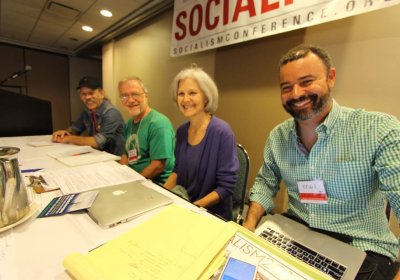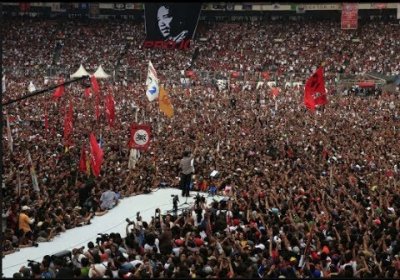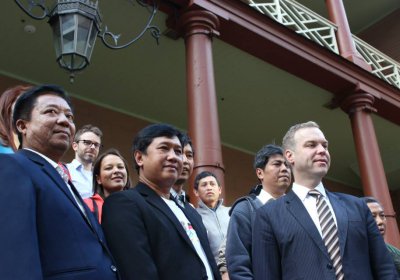It was the theme du jour at the B20 gathering in Sydney, which brought together more than 300 business leaders seeking to shape the agenda of the G20: Business knows best so leave the big decisions to us.
Prime Minister Tony Abbott said it and numerous self-serving CEOs happily served as a chorus.
But the standout croaky voice was that of global media mogul Rupert Murdoch: “Everybody in this room knows dozens or hundreds of very, very fine businessmen. How many people know a politician who can run a business?”
Peter Boyle
The unofficially successful bid for presidency Joko Widodo (popularly known as Jokowi) is “unprecedented thus far in post-authoritarian Indonesia”, according to Dr Vannessa Hearman, a lecturer in Indonesian Studies at the University of Sydney.
The bid survived a vicious anti-communist smear campaign by supporters of Jokowi's sole contender for presidency — the sacked former Suharto-era general Prabowo Subianto.
It is depressing but it is true. Prime Minister Tony Abbott is deliberately stoking racism and nationalism in a bid to reverse his collapse of public support, as shown by the polls.
Why else would he have made a speech that revived the legal fiction of terra nullius that was officially killed by the High Court in its historic 1996 Mabo decision?
Why else would he have chosen to declare, just before NAIDOC week that the British colonial invasion of this continent was a great act of “British foreign investment” that Australians today should be grateful for?
New red-green electoral alliances, a turn to ecosocialism and a deepening of the US International Socialist Organization's rethink on feminism were key features of its well-attended Socialism 2014 conference in Chicago.
The gap between rich and poor in the US is large and growing. It has sparked a popular campaign for a minimum wage of US$15 an hour for low-paid workers, and in defence of jobs of teachers and other social service providers.
The official results of the July 9 Indonesian presidential elections are not expected till at least July 22, but many unofficial “quick count” surveys and exit polls have proclaimed a winner.
Most of these unofficial polls have declared that former Jakarta governor Joko Widodo (popularly known as Jokowi) has defeated his sole challenger — sacked Suharto dictatorship general Prabowo Subianto — by a margin of up to 4%.
Australian environmental and international solidarity campaigner Natalie Lowrey was arrested and detained for six days in Kuantan, Malaysia for standing with Malaysian activists campaigning against Australian company Lynas Corp's toxic rare earth refinery near that city.
At a peaceful protest of more than 1000 people outside the Lynas plant on June 22, 16 protesters were arrested and a number were injured by police, one very severely. Lowrey was released with no charge on June 27, the other 15 protesters faced court on July 8 on a variety of charges. She has since returned to Australia.
One cannot but feel privileged and awed to meet three of Burma's “88 Generation” student uprising leaders: Min Ko Naing who has spent most of the years since 1988 uprising jailed by the Burmese military dictatorship for his opposition activities; Ko Jimmy, who spent 20 years as a political prisoner and who was recently thrown back into what he wryly describes as “our second home” for protesting against fuel price hikes; and Ko Ko Gyi who spent 17 years in prison for opposing the military regime.
Dr Chee Soon Juan, secretary-general of the Singapore Democratic Party (SDP), has been arrested and jailed several times for holding demonstrations and for making public speeches critical of Singapore's ruling People's Action Party (PAP) government.
Many people were shocked in January when non-profit development organisation Oxfam released a report that showed that the richest 85 people in the world owned more wealth than half of the world's population.
Within the space of a few months, that number has dropped to just 66.
Oxfam's latest report, Still The Lucky Country?, produced in preparation for the G20 summit in Brisbane in November, explodes the myth of an egalitarian Australia.
Prime Minister Tony Abbott is a notorious climate change denier. So is his Canadian counterpart, Stephen Harper.
But this is not their official position. In the face of rising global pressure for action to address catastrophic climate change, the official line of these two leaders is to “address” climate change, but not in a way that “clobbers the economy”, to use Abbott's latest three-word phrase.
An Aboriginal tent embassy was set up on May 26 to reclaim the historic Redfern Block.
Veteran Aboriginal activist Jenny Munro says the Block is Aboriginal land and the Aboriginal Housing Company was wrong to clear the Aboriginal residents out of it and open it to greedy developers.
The tent embassy is steadily growing in size and the call is out for solidarity. Drop in, show your solidarity and see what you can do to help. An "Abbott-proof fence" is going to be built on the site, embassy activists said.
Photos by Peter Boyle.
If you were to take Prime Minister Tony Abbott and the Coalition on face value, they appear to be against debt.
All the pain imposed on the poorest in society by the federal budget and all the cuts to education, health and welfare are justified as being necessary “medicine” to solve a horrendous debt problem left to them by previous Labor governments. Yes, we've heard that line over and over again.
Never mind the fact that the government's debt as a proportion of gross domestic product is one of the lowest among the developed countries and lower than it was in the 1950s and 1960s.
- Previous page
- Page 52
- Next page









